CANEGROWERS believes that Queensland's cane farmers are doing remarkable things when it comes to protecting and caring for their environment and the Great Barrier Reef.
For many years our members have been involved in an amazing array of projects and trials, and designed and implemented innovative and creative solutions, to improve productivity and profitability and reduce the impact of farming on the environment.
This is a snapshot of some of our growers and their stories from the past few years.
We acknowledge the efforts and commitment of all Queensland cane farmers who have proudly taken on the role of environmental stewards for many decades and will continue to do so long into the future.
 Angle Mustafa has taken advantage of Reef Programme funding with three initiatives in operation on his farm, each directly tied to reducing nutrient, pesticide and sediment run-off into the Great Barrier Reef lagoon. Watch more.
Angle Mustafa has taken advantage of Reef Programme funding with three initiatives in operation on his farm, each directly tied to reducing nutrient, pesticide and sediment run-off into the Great Barrier Reef lagoon. Watch more.
 Chris O’Kane is a third generation East Feluga cane grower that has Wet Tropics Major Integrated Project (MIP) sampling points on his property where rain chasers work to answer growers' water quality questions. Read more.
Chris O’Kane is a third generation East Feluga cane grower that has Wet Tropics Major Integrated Project (MIP) sampling points on his property where rain chasers work to answer growers' water quality questions. Read more.
 Drew Watson is one of many Wet Tropics cane growers reaping the benefits from one-on-one nutrient planning sessions funded by the Reef Trust III program. Read more.
Drew Watson is one of many Wet Tropics cane growers reaping the benefits from one-on-one nutrient planning sessions funded by the Reef Trust III program. Read more.
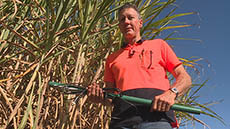 Drewe Burgess is using Bluetooth dataloggers, with the Atherton Tableland cane growers, to record and access irrigation information, saving time and boosting productivity through precision irrigation management. Watch more.
Drewe Burgess is using Bluetooth dataloggers, with the Atherton Tableland cane growers, to record and access irrigation information, saving time and boosting productivity through precision irrigation management. Watch more.

 Gary Raiteri is using soil probes and weather stations to ensure he irrigates his crops only when needed for maximum growth, while changes to his irrigation machinery and practices has resulted in less water and electricity costs, reduced run-off and increased productivity. Watch more.
Gary Raiteri is using soil probes and weather stations to ensure he irrigates his crops only when needed for maximum growth, while changes to his irrigation machinery and practices has resulted in less water and electricity costs, reduced run-off and increased productivity. Watch more.
 Gary Spotswood and wife Angela took out the Reef Conservation Award in 2017 for their work in restoring the ecological function of a coastal wetland on their property. Read more.
Gary Spotswood and wife Angela took out the Reef Conservation Award in 2017 for their work in restoring the ecological function of a coastal wetland on their property. Read more.
 Gerry Deguara and his sons are employing a range of farming methods helping to boost productivity and deliver environmental benefits for the Great Barrier Reef, including implementing a fallow program as a way of aiding soil health and putting nitrogen back into the ground 'nature's way'. Watch more.
Gerry Deguara and his sons are employing a range of farming methods helping to boost productivity and deliver environmental benefits for the Great Barrier Reef, including implementing a fallow program as a way of aiding soil health and putting nitrogen back into the ground 'nature's way'. Watch more.
 Glen Fasano and his sons Scott and Michael are using peanut fallows to increase organic matter in the soils and breaking the monoculture, while also making some money.
Glen Fasano and his sons Scott and Michael are using peanut fallows to increase organic matter in the soils and breaking the monoculture, while also making some money.
Read more.
 Greig Zunker and his father Graham have made the switch to a low-pressure lateral overhead irrigation system in a bid to reduce energy consumption and increase crop irrigation efficiencies. Watch more.
Greig Zunker and his father Graham have made the switch to a low-pressure lateral overhead irrigation system in a bid to reduce energy consumption and increase crop irrigation efficiencies. Watch more.
 Joe Marano says using SIX EASY STEPS has helped him to develop unique nutrient management plans for the different soil types on his farm, helping to save him money and reduce fertiliser run-off into the surrounding environment. Watch more.
Joe Marano says using SIX EASY STEPS has helped him to develop unique nutrient management plans for the different soil types on his farm, helping to save him money and reduce fertiliser run-off into the surrounding environment. Watch more.
 Lenny Parisi took out the esteemed Prince of Wales Environmental Leadership - Reef Sustainability Award at the 2019 Reef Champion Awards for converting seven hectares of cane land to a wetland environment. Watch more.
Lenny Parisi took out the esteemed Prince of Wales Environmental Leadership - Reef Sustainability Award at the 2019 Reef Champion Awards for converting seven hectares of cane land to a wetland environment. Watch more.
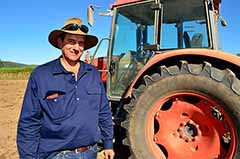 Lindsay Neilsen redefined his approach to soil health and nutrients, as part of an expansive three-year trial in Mackay, to determine if using slow-release EEFs will prove to be an answer to reducing nutrient loss. Watch more.
Lindsay Neilsen redefined his approach to soil health and nutrients, as part of an expansive three-year trial in Mackay, to determine if using slow-release EEFs will prove to be an answer to reducing nutrient loss. Watch more.
 Mark Hatch took part in a pilot project in the Burdekin using conjunctive use bores to combat rising groundwater levels in the region. Watch more.
Mark Hatch took part in a pilot project in the Burdekin using conjunctive use bores to combat rising groundwater levels in the region. Watch more.
 Michael Santarossa and his father Alan have introduced nutrient management plans, laser levelled their blocks and converted to a 1.8m row system. Read more.
Michael Santarossa and his father Alan have introduced nutrient management plans, laser levelled their blocks and converted to a 1.8m row system. Read more.
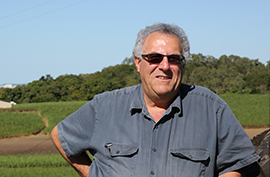 Paul Schembri (CANEGROWERS Chairman) is leading by example having achieved Smartcane BMP accreditation in 2016. He has challenged cane growers to undertake the process themselves and get the message out about the good work being done to protect the Great Barrier Reef. Read more.
Paul Schembri (CANEGROWERS Chairman) is leading by example having achieved Smartcane BMP accreditation in 2016. He has challenged cane growers to undertake the process themselves and get the message out about the good work being done to protect the Great Barrier Reef. Read more.
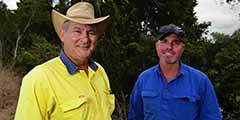 Ray Cervellin, Ray Marbelli and Joe Grotelli provide an insight into how damaged farms and waterways have not just been repaired but improved, after the disastrous Tropical Low in 2019 to more resilient for the future. Watch more.
Ray Cervellin, Ray Marbelli and Joe Grotelli provide an insight into how damaged farms and waterways have not just been repaired but improved, after the disastrous Tropical Low in 2019 to more resilient for the future. Watch more.
 Ray Vicarioli has implemented a range of techniques to deal with an oversupply of water on his farm, including a sophisticated sub-surface drainage system to minimise run-off and maximise the storage of nutrients in soil. Read more.
Ray Vicarioli has implemented a range of techniques to deal with an oversupply of water on his farm, including a sophisticated sub-surface drainage system to minimise run-off and maximise the storage of nutrients in soil. Read more.
 Richard Padovan is using a combination of plantings and the construction of a 30 metre rock wall designed to fix eroding stream banks by increasing their ability to withstand high water flow events. Read more.
Richard Padovan is using a combination of plantings and the construction of a 30 metre rock wall designed to fix eroding stream banks by increasing their ability to withstand high water flow events. Read more.
 Robert Bonassi is focused on fallow crops, mill by-products and soil tests in his transition to cane that is less reliant on artificial fertilisers. Read more.
Robert Bonassi is focused on fallow crops, mill by-products and soil tests in his transition to cane that is less reliant on artificial fertilisers. Read more.
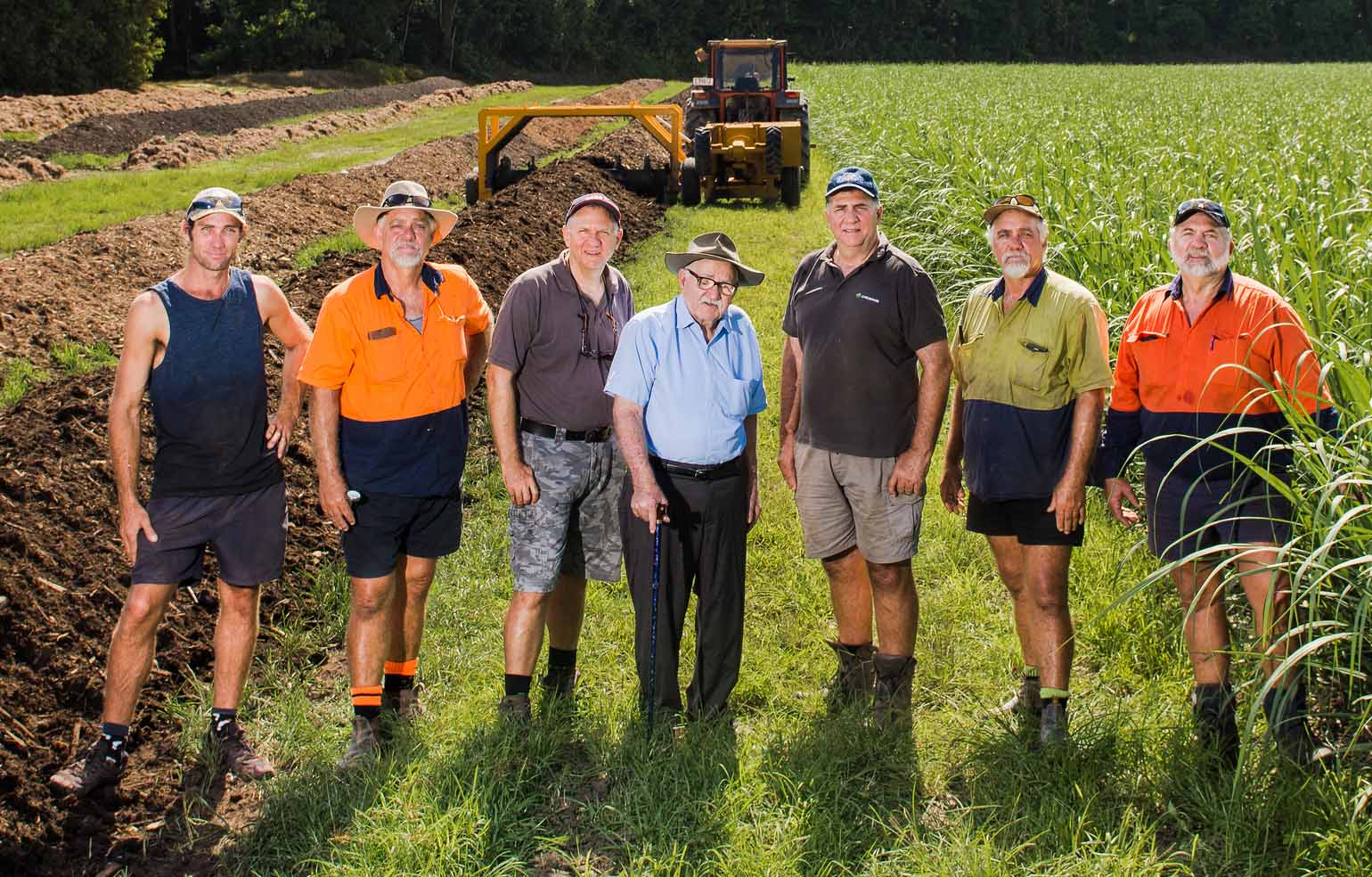 The Rossi family at Gordonvale is improving soil health and reducing their farm's nitrogen inputs by 30% by making compost on a large scale. Watch more.
The Rossi family at Gordonvale is improving soil health and reducing their farm's nitrogen inputs by 30% by making compost on a large scale. Watch more.
 Sam Spina and brother Michael have slashed their fertiliser rates and costs by planting fallow crops, varying fertiliser application rates across paddocks, laser-levelling cane land and installing spoon drains. Read more.
Sam Spina and brother Michael have slashed their fertiliser rates and costs by planting fallow crops, varying fertiliser application rates across paddocks, laser-levelling cane land and installing spoon drains. Read more.
 Steven Bonso and his father Leo have reduced soil compaction levels by using wider 1.8m rows. They use a controlled traffic system with GPS autosteer on their tractors. Read more.
Steven Bonso and his father Leo have reduced soil compaction levels by using wider 1.8m rows. They use a controlled traffic system with GPS autosteer on their tractors. Read more.

.jpg)